Download PDF version
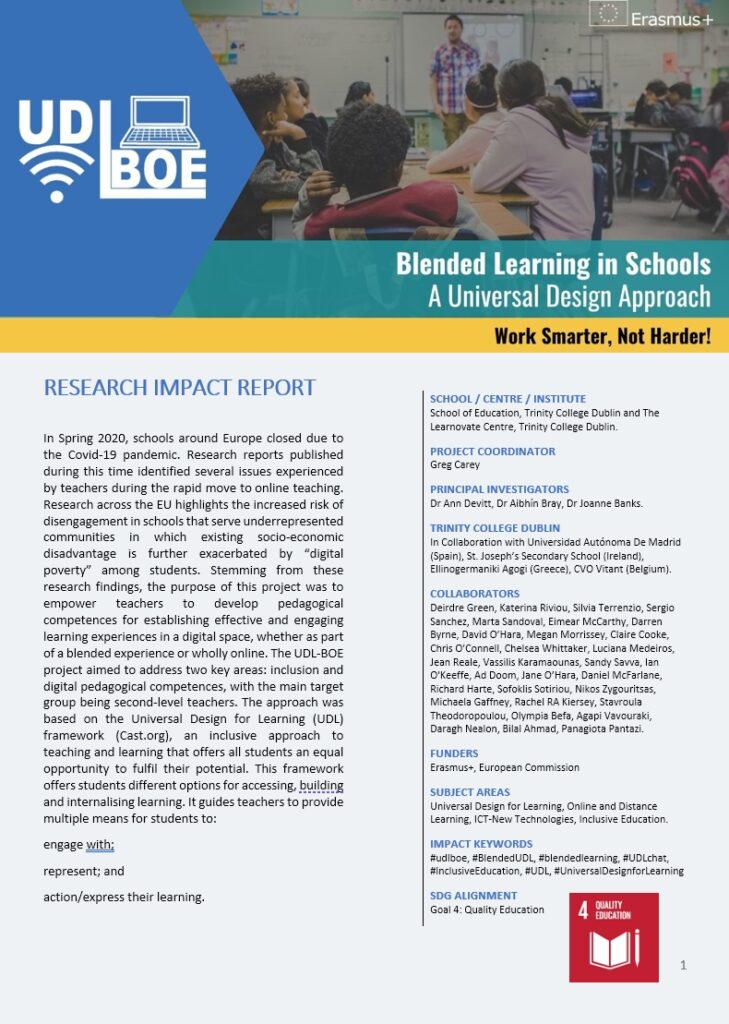
In Spring 2020, schools around Europe closed due to the Covid-19 pandemic. Research reports published during this time identified several issues experienced by teachers during the rapid move to online teaching. Research across the EU highlights the increased risk of disengagement in schools that serve underrepresented communities in which existing socio-economic disadvantage is further exacerbated by “digital poverty” among students. Stemming from these research findings, the purpose of this project was to empower teachers to develop pedagogical competences for establishing effective and engaging learning experiences in a digital space, whether as part of a blended experience or wholly online. The UDL-BOE project aimed to address two key areas: inclusion and digital pedagogical competences, with the main target group being second-level teachers. The approach was based on the Universal Design for Learning (UDL) framework (Cast.org), an inclusive approach to teaching and learning that offers all students an equal opportunity to fulfil their potential. This framework offers students different options for accessing, building and internalising learning. It guides teachers to provide multiple means for students to:
engage with;
represent; and
action/express their learning.
SCHOOL / CENTRE / INSTITUTE
School of Education, Trinity College Dublin and The Learnovate Centre, Trinity College Dublin.
PROJECT COORDINATOR
Greg Carey
PRINCIPAL INVESTIGATORS
Dr Ann Devitt, Dr Aibhín Bray, Dr Joanne Banks.
TRINITY COLLEGE DUBLIN
In Collaboration with Universidad Autónoma De Madrid (Spain), St. Joseph’s Secondary School (Ireland), Ellinogermaniki Agogi (Greece), CVO Vitant (Belgium).
COLLABORATORS
Deirdre Green, Katerina Riviou, Silvia Terrenzio, Sergio Sanchez, Marta Sandoval, Eimear McCarthy, Darren Byrne, David O’Hara, Megan Morrissey, Claire Cooke, Chris O’Connell, Chelsea Whittaker, Luciana Medeiros, Jean Reale, Vassilis Karamaounas, Sandy Savva, Ian O’Keeffe, Ad Doom, Jane O’Hara, Daniel McFarlane, Richard Harte, Sofoklis Sotiriou, Nikos Zygouritsas, Michaela Gaffney, Rachel RA Kiersey, Stavroula Theodoropoulou, Olympia Befa, Agapi Vavouraki, Daragh Nealon, Bilal Ahmad, Panagiota Pantazi.
FUNDERS
Erasmus+, European Commission
SUBJECT AREAS
Universal Design for Learning, Online and Distance Learning, ICT-New Technologies, Inclusive Education.
IMPACT KEYWORDS
#udlboe, #BlendedUDL, #blendedlearning, #UDLchat, #InclusiveEducation, #UDL, #UniversalDesignforLearning
SDG ALIGNMENT
Goal 4: Quality Education

RESEARCH SUMMARY
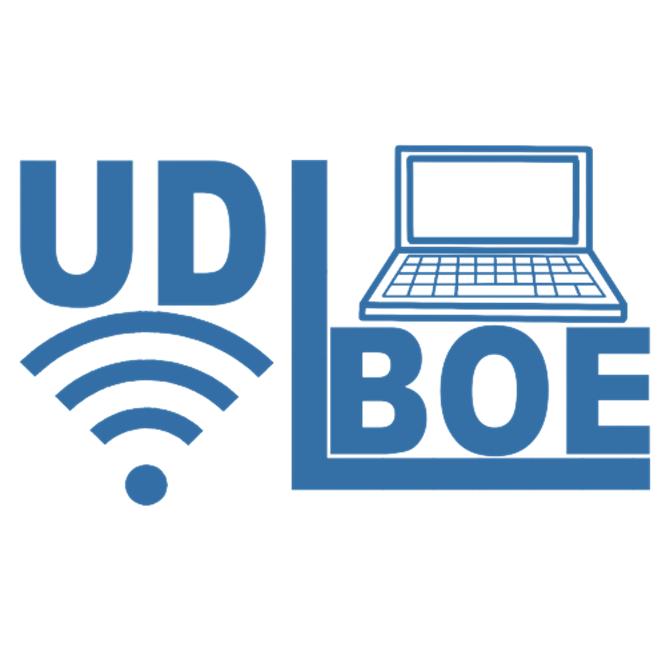
The UDL-BOE project was launched in 2020 in response to the challenges of digital learning faced by schools and exacerbated by the COVID-19 pandemic. The aim of this project was to ensure that distance, online and blended learning is effective, inclusive, and engaging. It focused on developing practical tools to empower teachers to deliver effective and engaging learning in a digital space.
The project created a consortium of partners from Ireland, Greece, Belgium, and Spain, representing a mixture of primary and second-level teachers and education researchers, with the common aim of harnessing UDL to achieve ‘an EU-wide common understanding of how to make distance, online & blended learning effective, inclusive & engaging’ (a strategic priority of the EC Digital Education Action Plan 2021-2027). The project was led by researchers in the School of Education, Trinity College Dublin, and members of the Learnovate Centre, Trinity College Dublin, in collaboration with Universidad Autónoma De Madrid (Spain), St. Joseph’s Secondary School (Ireland), Ellinogermaniki Agogi (Greece), CVO Vitant (Belgium).
By implementing this project, the UDL-BOE team aimed to support teachers to deliver inclusive and engaging learning in a digital space using the Universal Design for Learning framework. This included the provision of a digital overlay to the UDL framework to scaffold teachers’ implementation of UDL principles in remote/blended contexts, a self-evaluation tool for teachers to identify aspects of the digital UDL framework with which they require support; an associated learning model to support teachers’ creation of digital, UDL activities that include a focus on key skills and competences; Open Educational Resources to scaffold implementation of the framework; and a professional development module which will focus on Area 5 of the DigCompEdu Framework: empowering learners through accessibility and inclusion, differentiation and personalisation.
KEY OUTPUTS
- The design of a digital learning overlay for the UDL framework, in consultation with all partners.
- Based on the Bridge21 activity model, we provided a practical model for the design of lessons that incorporates these digital UDL principles. Developed over 10 years ago by Trinity Access, the Bridge21 model is a framework used to design contextualised classroom activities that are team- and project-based and involve learning through technology. Our Irish school partner, St. Joseph’s Secondary School in Dublin led this activity as they have extensive experience with integrating this model into their school curriculum. This output was also informed by surveying other schools who use the model in their face to face and online offerings.
- Drawing on the expertise of our partner in Madrid, Universidad Autónoma De Madrid, we designed and implemented a self-evaluation tool for teachers to identify aspects of the digital UDL framework where they require support, linked to appropriate resources. The tool was based on the UDL digital overlay and focused on digital pedagogical competences.
- The development of Open Educational Resources (OERs). Our Greek partners, Ellinogermaniki Agogi, led the resource development output associated with this project. EA have led multiple projects in this area (e.g., UDLnet, http://www.udlnet-project.eu/ ). These resources were adaptable exemplars of integrating digital UDL principles. Contributions of examples for these resources were also made by each of the partners specific to their country curricula.
- The final project output was to develop training materials and a professional development module, so that the framework’s learnings could be disseminated and utilised by a wide range of teachers across Europe. This was led by CVO Vitant, Belgium. These tools were developed to support teachers and schools in creating inclusive strategies for the digital provision of teaching and learning in their own educational context.
IMPACT SUMMARY
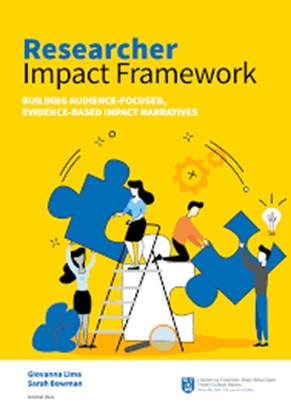
Interest in research impact has increased in recent years, with levels of insight and knowledge of practice advancing in ways which more effectively address meaningful global change (Lima & Bowman, 2022; Rickards et al., 2020). Research impact can be described simply as, “how our research benefits society and the economy” (University of Galway, 2023). Research impact is usually comprised of academic impact (examining how your research has contributed to academic advancement) and societal and economic impact (how your research has contributed to individuals, organisations and nations on a societal and economic level) (University of Galway, 2023).
The UDL-BOE team has adopted the Researcher Impact Framework (RIF) as developed by Lima and Bowman (2022) from Trinity College Dublin to articulate the reach of the project impact across academic, societal and economic spheres. The RIF is a useful framework that was developed as an output of Trinity College Dublin’s Research Impact Pilot. Lima and Bowman (2022, p. 2) state, “The RIF provides a structure for crafting audience-focused, evidence-based impact narratives that connect scholarly activities, reach, use, and relevance data to scientific and societal outcomes”. The framework examines research impact across four impact areas:
- Generation of knowledge;
- Supporting the research community;
- Contributions to broader society;
- Development of individuals and collaborations.
The UDL-BOE team were conscious of the need to demonstrate the relevance of the project’s research achievements from the outset of the project and have thus engaged in a variety of activities to maximise on the project’s research impact. In the upcoming sections, details of the UDL-BOE project outputs are described in terms of these four impact areas described above.
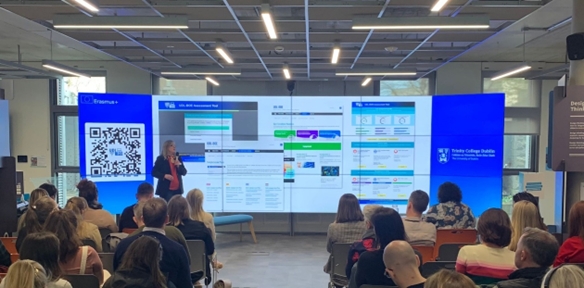
DETAILS OF IMPACT
Generation of Knowledge
The RIF recognises researchers as creative and critical thinkers, highlighting the importance of research in contributing to theoretical knowledge and innovation (Lima & Bowman, 2022). The UDL-BOE team completed several relevant dissemination activities which contributed to the generation of knowledge within UDL and educational fields. A significant output in this area was the development of a UDL Support Tool, and UDL Evaluation Tool, to support teachers in reflecting upon and enhancing the use of technology in their classrooms. These tools were developed in four languages, namely English, Greek, Spanish and Dutch. Additionally, our partners in St. Joseph’s Secondary School created lesson plans that can be used to support teachers within the classroom. These lesson plans can serve as a blueprint to be directly embedded into the classroom or adapted to suit specific needs. This was followed by the creation of a professional development learning module for teachers to increase knowledge of UDL in the classroom. The team also identified and curated Open Educational Resources (OER’s) for use.
The UDL-BOE team contributed several relevant research papers to academic journals and conferences, including ‘Mapping Evidence-Based Practices within the Universal Design for Learning Framework’ for the AERA 2023 issue, ‘What next for Universal Design for Learning? A Systematic Literature Review of Technology in UDL Implementations at Second Level’ for BJET, and ‘A Systematic Literature Review on the effectiveness of Universal Design for Learning in second-level education: where next?’, a systematic review examining future directions for UDL in second-level education. Additionally, the team co-ordinated applications for several additional funding avenues to extend the impact of UDL within relevant contexts, including applications to the Spencer Foundation, Horizon and further Erasmus+ project funding.
Supporting the Research Community
The RIF focuses on research impact which supports the research community, demonstrating that, “the researcher understands strategic direction and intellectual developments within the discipline; has connections to other research areas; participates in and exercises influence on the research agenda, policies, and procedures; and inspires good research practice in the wider community which enhances the research system” (Lima & Bowman, 2022, p. 12). The UDL-BOE project team comprises several academics in key teaching and learning positions, such as Dr Joanne Banks, the Director of Inclusion, School of Education at Trinity College Dublin, as well as Dr Ann Devitt, the Director of Undergraduate Teaching and Learning, School of Education at Trinity College Dublin and Dr Aibhín Bray, acting D.Ed. Coordinator, and Professional Master of Education strand leader for Mathematics Education. Within these positions these members of the UDL-BOE team have been able to nurture knowledge of UDL teaching practices with the next generation of teachers in Ireland.
Contributions to Broader Society
The RIF examines the impact of research on broader society. Impact in this area aims to, “demonstrate the researcher’s knowledge, skills, and commitment to realising the impact of their research for/with beneficiaries” (Lima & Bowman, 2022, p. 13). The UDL-BOE team prioritised expanding public knowledge of UDL and influencing educators in their professional practice. With these goals in mind, the UDL-BOE team developed an online presence creating a Twitter profile, UDL-BOE website and LinkedIn profile. Members of the team also furthered knowledge of UDL through individual podcasts such as Dr Joanne Banks’ ‘Inclusion Dialogue’ and the Learnovate Insights podcasts. The UDL-BOE team also developed a number of interactions with various news outlets, such as the Irish Times, ThinkBusiness and TechCentral.ie
Development of Individuals and Collaborations
The RIF focuses on research which, “engages in supportive practices and relationships with others, nurtures talent, and helps develop skilled researchers” (Lima & Bowman, 2022, p. 11). Considering this aim, the UDL-BOE team have invested in this impact area significantly. Collaboration between the project partners was productive and resulted in the furthering of knowledge of UDL in different contexts. The project’s dissemination efforts in this area were co-ordinated across four categories, namely student teachers, teachers, early career researchers and educational corporates. The UDL-BOE team made multiple presentations focusing on UDL and inclusion principles across multiple platforms.
The presentations aimed at teachers and student teachers included various Multiplier events, in the four partner countries (Ireland, Spain, Belgium and Greece) in which teachers were introduced to UDL principles and engaged with the UDL Teacher Support Tool. Additional presentations included ‘Learning from the Extremes Teacher Training Course’ at the Ellinogermaniki Agogi, presentations by the Universidad Autónoma de Madrid including ‘La Educación más allá del currículo’, ‘Metodología viva: acompañándonos para acompañar’ and ‘Las nuevas competencias de enseñanza online en tiempos de COVID’. The Irish partners of the UDL-BOE team conducted multiple workshops and teacher training sessions at St Joseph’s Secondary School, focused on developing teachers’ understanding and confidence in using UDL in the classroom. Additionally, the Professional Master of Education students at Trinity College Dublin were introduced to the UDL Support and Evaluation Tools as a part of their exposure to UDL in the classroom.
The UDL-BOE team have also partaken in various research conferences and symposia within the research community, particularly aimed at early career researchers. This includes partaking in a Master’s Degree conference at the Universidad del Atlántico in Colombia, entitled, ‘El diseño universal para el aprendizaje como metodología de una pedagogía inclusiva y la planeación curricular’, a presentation at the 8th Annual CAST UDL Symposium, entitled, ‘What has technology ever done for us?’, and presentations at the Summer School of Digital Humanities at the UniMore University in Modena, Italy, which focused on “Universal Design for Learning: considerations for accessibility in learning design”. Further efforts to encourage the development of early career researchers include bringing research assistants onto the UDL-BOE team. Members of the UDL-BOE team also supervised several students completing dissertations in related areas of research.
Dissemination efforts directed towards educational corporates included an online presentation on UDL-BOE to Learnovate Schools/K-12 members in Ireland as well as a presentation entitled, ‘Lessons to Learn from Inclusive Education’ by Dr Joanne Banks at the Learnovation 2022 Conference in Dublin. Other dissemination efforts which encouraged the development of individuals and collaborations included the team co-authoring systematic reviews with our school partners, the redesign of the language and society module within the Trinity Centre for People with Intellectual Disabilities (TCPID) department, the introduction of the IO5 Digital Teacher Professional Development Module, and members of the UDL-BOE team completing the UDL Ahead Badge.
ALIGNMENT WITH POLICIES AND STRATEGIES
The UDL-BOE project is aligned with a number of key national and international policies and strategies including:
- Trinity College Dublin’s 2020-2025 Strategy
- Trinity’s Living Research Excellence Strategy
- The Irish Research Council’s 2020-2024 Strategy
- The Junior Cycle Framework (National Council for Curriculum and Assessment)
- The Department of Further and Higher Education, Research, Innovation and Science National Access Plan 2022-2028
- The Department of Further and Higher Education, Research, Innovation and Science Statement of Strategy 2021-2023
- The Horizon Europe 2021-2024 Strategy
- European Commission Digital Education Action Plan 2021-2027
- In addition, the project is in line with the current initiative by the Institute of Educational Policy (IEP) in Greece for the training of teachers on differentiated learning.
- Digisprong and Edusprong policies from the Flemish Ministry of Education in Belgium, which aims to narrow the digital divide of Flemish secondary education compared to the European standards.
CONCLUSION
Within academic spheres, institutions have faced greater pressure in ensuring the academic, social and economic impact of research (Rickards et al., 2020). From the outset of the UDL-BOE project, the team were cognisant of this need. Using the RIF framework proposed by Lima and Bowman (2022), this impact statement outlines the dissemination efforts of the team, ranging across four impact areas, namely the generation of knowledge, the development of individuals and collaborations, supporting the research community and contributions to broader society. Within each of these impact areas, a number of activities were undertaken, and these are outlined in detail in this document.
CONTACT US
TWITTER: @udlboe
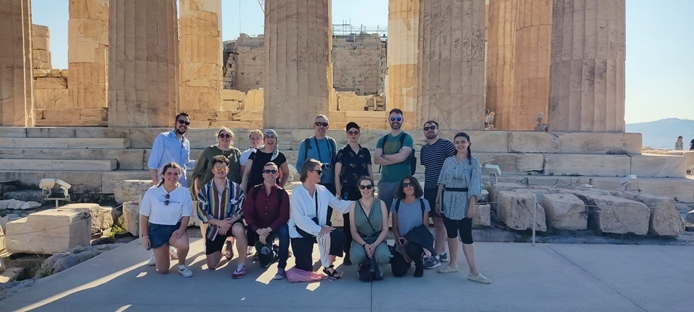
SUPPORTING INFORMATION
Funding
This project was funded by the European Commission’s Erasmus + programme.
Relevant Links
Special Issue in Frontiers in Education
UDL-BOE Showcase Multiplier Event Dublin, April 21st 2023
8th Annual CAST UDL Symposium Session: What has technology ever done for us?
REFERENCES
Lima, G., & Bowman, S. (2022). Researcher Impact Framework: Building Audience-Focused Evidence-Based Impact Narratives. https://doi.org/10.25546/98474
Rickards, L., Steele, W., Kokshagina, O., & Morales, O. (2020). Research Impact as Ethos. RMIT University.
University of Galway. What is Research Impact? University of Galway. Retrieved 14th March from https://stories.nuigalway.ie/what-is-research-impact-/index.html
CITE THIS DOCUMENT
Whittaker, C. (2023). UDL-BOE Blended Learning in Schools, A Universal Design Approach: Impact Statement. Trinity College Dublin.